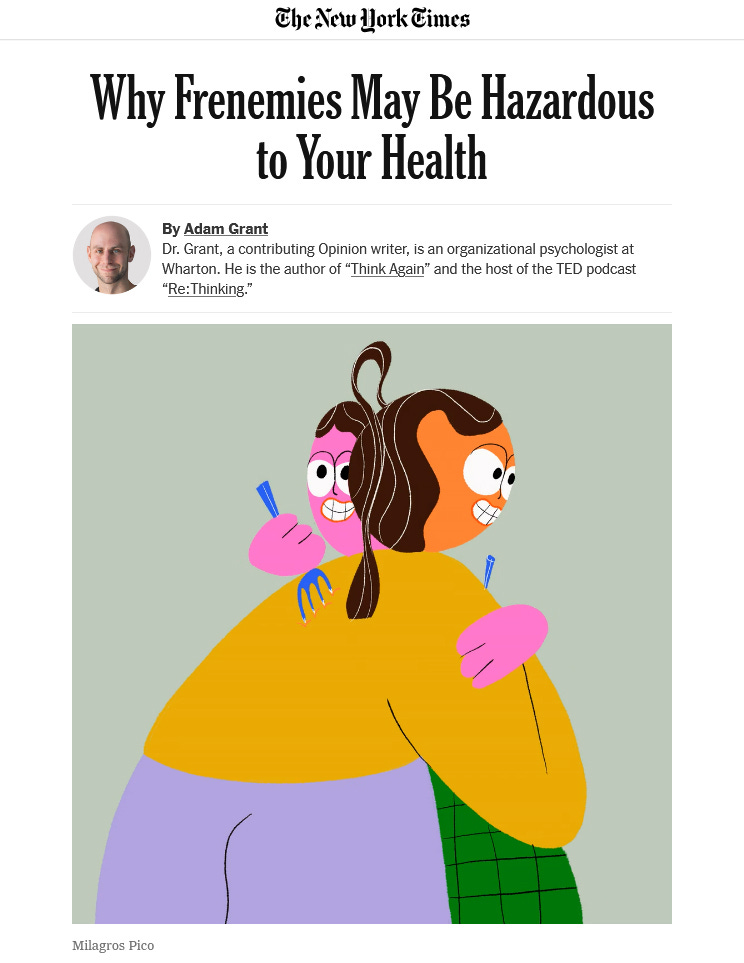The most toxic relationships aren’t what you think
Frenemies can wreak more havoc on your well-being than enemies.
We all have frenemies. They’re people who make you feel both good and bad, and they exist in every walk of life. You might have mixed feelings about a relative, a neighbor, a colleague, or a mentor.
My article in today’s NYT explores why frenemies may be hazardous to your health. Surprisingly, these ambivalent relationships turn out to be even more toxic than negative ones.
In one experiment, when people were under stress, merely reminding them of their ambivalent relationships led to greater heart rate reactivity than priming them with their negative relationships. In another study, ambivalent relationships predicted higher coronary artery calcification among older married couples.
I didn’t see that coming. I figured the most toxic ties would be with people who diminish you. But it’s even worse to rely on support from the very person who diminishes you.
My article was about mostly why ambivalent relationships are problematic. The early questions from readers are about how to handle them.
Too often, we do nothing. We don’t like to admit having mixed feelings about people close to us, let alone talk about it. I think part of the problem is that Western cultures tend to sweep ambivalence under the rug. We’re drawn to the linear simplicity of good or bad, and we struggle with the dialectical complexity of yin and yang. It’s hard for us to acknowledge that the same person can give to us and take from us. It’s even harder for us to accept that we can do that to others. So we bite our tongues and suffer in silence.
In my view, if a relationship is worth maintaining, it’s worth improving. And that’s not a job for you to do alone. It requires a conversation about what’s working and what’s not.
Ambivalent relationships are a two-way street. If you have mixed feelings, it’s not just due to their actions—it’s also due to your reactions. You’ve both contributed to the interaction, and it may be weighing on them too.
Fixing an ambivalent relationship requires the trust and respect to tell each other the truth. It’s better to embrace awkwardness for a shot at salvaging a relationship than avoid the discomfort and lose the relationship. In a healthy relationship, honesty isn’t a sign of disloyalty—it’s an expression of care. We don’t expect everything to be good, but we’re always striving to do better.
One reader said she was sending my article to a colleague and asking: “Is this us?”
We all get hurt by the people we love, and unpleasant interactions don’t mean we should walk away. Research suggests that on average, people tend to be happier staying in imperfect marriages and imperfect jobs than abandoning them altogether.
If someone is abusive, though, it doesn’t matter how many positives they bring to the table. You're not obligated to maintain a tie with anyone who treats you poorly. Prior help is not an excuse for present harm. No friend, relative, or mentor deserves unconditional loyalty. You can appreciate someone’s role in your past without wanting them in your future.
In The Godfather: Part II, Michael Corleone advised, “Keep your friends close, but your enemies closer.” That advice doesn’t apply to frenemies. If it becomes impossible to turn them into true friends, it might be time to let them go.



From my experience, a lesson from Givers and Takers. When I think of my frenemy/ies, they tend to be takers, or at least strategically limit their contributions to quid pro quo.
This makes complete sense to me. I had one particular frenemy in the workplace and the relationship was far more stressful then with those I deeply disliked. It’s easy to dismiss the enemies. With the frenemy, I kept thinking that I must be doing something wrong. I wasn’t 😉